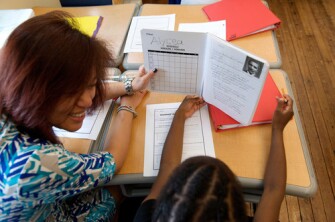
Professional development is often focused on helping teachers improve for students. But what about for their parents?
A new study by researchers at the University of Missouri shows that professional development programs for teachers can improve how parents and teachers communicate. What’s more, having teachers rate parents’ involvement in the early stages of students’ schooling can be an accurate indicator of their future success.
It is well-known that parent-teacher interaction is important to students’ development of academic and social-emotional skills, but the question often remains: How can schools measure and improve parent participation?
For this latest study, 105 teachers from nine urban schools (who together interacted with more than 1,800 K-3 students and parents) were randomly selected to participate in a professional development program to improve relationships with both parents and students. Over the course of a school year, the teachers attended trainings that helped them think about their own biases, make support plans for students with behavioral issues, and learn strategies to improve communication and cooperation with parents.
Teachers who took the training were more likely to develop favorable perspectives of parental involvement (such as attending meetings, volunteering, and visiting the school). In turn, parents whose children studied with those teachers were more likely to be involved and have a better parent-teacher relationship.
Researchers also collected responses from teachers at the beginning and end of the school year about student behavior, academic performance, and their relationships with parents, as well as observations about parent involvement. Teachers’ perceptions of participation were often telling: Students of the parents that teachers rated as positively involved were more successful in academics and had fewer behavioral problems than those whose parents had little involvement.
Keith Herman, an education professor at the university and the co-author of this latest study, said the results illustrate the need to train teachers to develop meaningful relationships with their students’ parents.
How often teachers reach out to a student’s family about behavior and academic issues can also be affected by parents’ race, ethnicity, or immigrant status, according to a study released by New York University last fall—another testament to why teacher training around parent-teacher communication may be important for students.
Training programs are not the only interventions targeting the parent-teacher relationship that improve student outcomes. My colleague Madeline Will wrote in January about Home Works!, a St. Louis program that uses home visits from teachers to improve student attendance and test performance.
Teachers should be “mindful of how powerful their perceptions of others can be in influencing student development,” Herman wrote in an email to Education Week. “It is obviously a huge challenge for teachers to stay aware of their social perceptions of all the kids and parents in their class, but ongoing reflection about their relationships with and judgements of parents and students can pay huge dividends.”
Source: Image by Flickr user US Department of Education licensed under Creative Commons